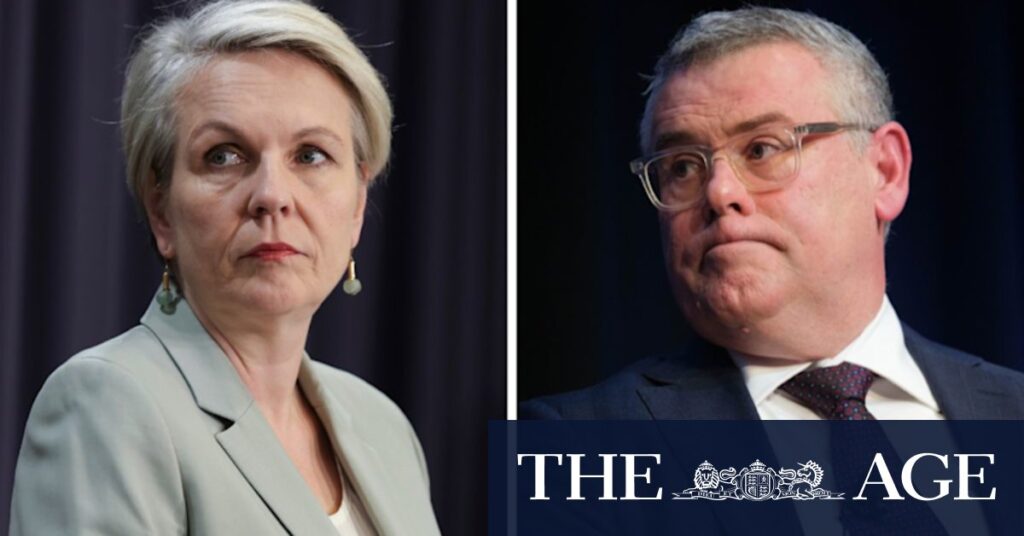
Labor is set to ignite a major political battle next week as it reintroduces its contentious nature laws in parliament. This move has already drawn ire from environmentalists concerned about potential habitat destruction and business groups worried about the government’s expanded powers to veto investments.
The government plans to leverage these laws as a strategic tool, aiming to brand the Greens as obstructionists and the Coalition as anti-environment should they oppose the bill in the Senate. This effort follows a previous attempt to enact similar reforms, which was halted by Prime Minister Anthony Albanese last term due to opposition from West Australian Premier Roger Cook and the state’s influential mining lobby.
Political Strategy and Historical Context
More than a dozen MPs and party members recently participated in a phone conference with Environment Minister Murray Watt to strategize on increasing pressure on Coalition and Greens MPs to support the bill. This initiative includes launching a website designed to flood MPs’ inboxes with advocacy messages.
The reforms, previously dubbed the “nature positive agenda” by former environment minister Tanya Plibersek, have been rebranded by Watt as “environment protection.” According to a senior government source, who spoke on condition of anonymity, the reforms are scheduled to be tabled in parliament next week.
Watt emphasized the importance of passing these laws, citing the inadequacy of current regulations in protecting both the environment and business interests. “I have always said that stakeholders would need to be willing to compromise in order to get these vital laws passed,” Watt stated. “No one will get everything they want.”
Industry Concerns and Environmental Implications
Industry groups, privy to some details of the reforms but not authorized to speak publicly, expressed concerns over a new “unacceptable impacts” test. This test could grant the minister extensive authority to reject new projects. Additionally, businesses are apprehensive about the requirement for large-emitting projects to demonstrate climate change mitigation plans before receiving approval. An industry insider described this as a “backdoor” method to implement the Greens’ longstanding demand for a “climate trigger” to halt fossil fuel projects.
The government, however, dismissed these concerns, asserting that the bill does not introduce a new test but merely aligns with existing compliance under the government’s safeguard mechanism pollution caps.
Opposition and Potential Alliances
Opposition Leader Sussan Ley previously attempted to introduce nature reforms in 2022 during her tenure as environment minister under the Morrison government. Labor is now exploring a potential alliance with Ley, which could serve as a test of her influence over right-wing backbenchers who are resistant to climate targets. Alternatively, Labor may seek collaboration with the Greens.
Coalition environment spokesperson Angie Bell reserved judgment, stating, “We know the devil is in the detail.”
Environmentalists’ Concerns and Expert Opinions
Conservationists are particularly worried about proposed changes to the offsets regime, which requires developers to compensate for unavoidable environmental damage. For instance, a wind farm seeking to clear forest for construction might be required to invest more in forest conservation elsewhere. However, developers would not need to provide specific offsets, instead contributing to a government-managed account.
Professor Hugh Possingham, co-chief of the Biodiversity Council and former Queensland chief scientist, criticized state-run offset payment schemes, stating,
“They have largely amounted to pay-to-destroy regulatory systems.”
Greens environment spokesperson Sarah Hanson-Young argued that the reforms favor industry at the expense of nature. “While industry will no doubt say they haven’t got enough, their grubby fingerprints are all over it,” she remarked. “These laws are written to help big business and the mining companies, at the expense of nature.”
Future Prospects and Economic Implications
Viewed as a problem-solver within the cabinet, Watt assumed Plibersek’s environment portfolio post-election to revive the nature bill. He has engaged in extensive discussions with business groups, mining companies, conservationists, and state governments.
Former Treasury boss Ken Henry emphasized the significance of environmental reform, stating in July that it was more crucial to enhancing Australia’s productivity than tax reform or any other measure.
The Albanese government faces mounting pressure to amend current laws from renewable energy sectors, which are crucial to achieving Australia’s climate goals. These industries have reported project delays spanning several years. A government source contended that industry fears are exaggerated and that the benefits of streamlined approvals would outweigh concerns.
Despite these efforts, Australia continues to grapple with a troubling record of wildlife destruction. The nation accounts for 38 percent of global mammal extinctions, highlighting the urgency of effective environmental legislation.






